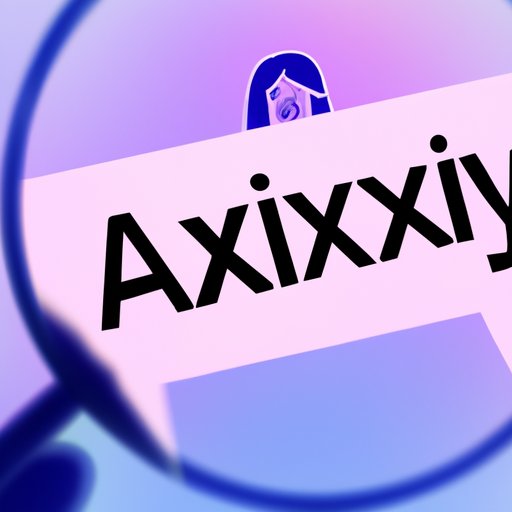
Anxiety as a Mental Illness: Exploring the Definition, Comparison, Best Treatments, Stigma, and Personal Experience
Anxiety is a common human emotion that many feel from time to time. It is a natural response to stress and can actually be helpful in certain situations. However, for some individuals, anxiety can be overwhelming and can interfere with their daily life. In these cases, anxiety is not just an emotion but a mental illness that requires treatment. In this article, we will delve into the definition of anxiety as a mental illness, compare it to other mental illnesses, examine the best treatments available, discuss the stigma surrounding mental illness, and provide a personal account of someone who has struggled with anxiety. By the end of this article, we hope to offer actionable insights that can help readers manage and treat their anxiety.
Definition-Based Article
Anxiety as a mental illness is a condition that is characterized by excessive, uncontrollable worry or fear about everyday situations. It is more than just feeling stressed or worried, as it involves intense fear or dread about situations that others deem as mundane or non-threatening. Anxiety disorders can take many forms, including general anxiety disorder, panic disorder, social anxiety disorder, obsessive-compulsive disorder, and post-traumatic stress disorder.
According to the American Psychiatric Association’s DSM-5, anxiety is classified as a mental disorder. The DSM-5 defines anxiety as “a reaction to stressors that are immediate or impending, which involve a sense of fear and avoidance.” In other words, anxiety is not just an emotion but a mental disorder that requires diagnosis and treatment.
Comparison-Based Article
Unlike anxiety, other mental illnesses, such as depression, bipolar disorder, or schizophrenia, are not typically characterized by worry or fear. Rather, they are defined by other symptoms, such as changes in mood, perception, or behavior. While anxiety is a condition that can exist on its own, it can also be a symptom of other mental illnesses, such as depression or post-traumatic stress disorder.
Despite the differences between anxiety and other mental illnesses, they are all classified as mental health disorders and require treatment. Anxiety disorders are one of the most common mental illnesses, affecting around 40 million adults in the United States every year.
Best Treatments-Based Article
The best treatment methods for anxiety depend on the individual and the severity of their condition. However, the most effective treatments available include medication, therapy, and lifestyle changes.
Medications such as selective serotonin reuptake inhibitors (SSRIs) and benzodiazepines are often prescribed to help manage anxiety symptoms. These medications can be highly effective but can also have side effects. It is essential to work closely with a medical professional to determine the best course of treatment.
Therapy, such as cognitive-behavioral therapy (CBT) or exposure therapy, is another commonly used treatment for anxiety. Therapy can help individuals learn coping mechanisms to better manage their anxiety, such as relaxation techniques, re-framing anxious thoughts, and problem-solving skills.
Lifestyle changes can also be effective in managing anxiety. Regular exercise, a healthy diet, and practicing stress-management techniques can all help to alleviate anxiety symptoms. It’s essential to work with a medical professional to develop a well-rounded treatment plan that works best for each individual.
Stigma-Based Article
Despite the prevalence of anxiety disorders, there is still a significant amount of stigma surrounding mental illness. Many people view individuals with mental illnesses as weak, lazy, or attention-seeking. These negative perceptions can make it difficult for individuals with anxiety disorders to seek help or manage their condition.
This stigma can be particularly harmful when it comes to seeking treatment. Fear of being labeled as “crazy” or “unstable” can prevent individuals from seeking help or disclosing their condition to others. The truth is that anxiety disorders are just as legitimate as any other illness, and individuals with these disorders deserve proper treatment and support.
Personal Experience-Based Article
Personal accounts of individuals who have struggled with anxiety can help to provide insight into managing and treating this illness. A personal account can offer hope and encouragement to those struggling with anxiety, reminding them that they are not alone. In many cases, individuals who have overcome anxiety may provide inspiration and guidance to others.
People with anxiety disorders can learn a lot from individuals who have managed to overcome their anxiety. Understanding how someone else who has gone through the same experiences as you managed their condition can be immensely helpful and reassuring.
Conclusion
Anxiety is a mental illness that affects many individuals. One of the most significant challenges associated with anxiety is the stigma associated with mental illness. It can make individuals hesitant to seek help or disclose their condition to others. However, with effective treatment, anxiety can be managed, and symptoms can be alleviated. We hope that this article has provided some insight into the definition, comparison, best treatments, stigma, and personal experiences of anxiety as a mental illness. Remember, if you are struggling with anxiety, you are not alone. Treatment is available, and you can overcome this condition.


